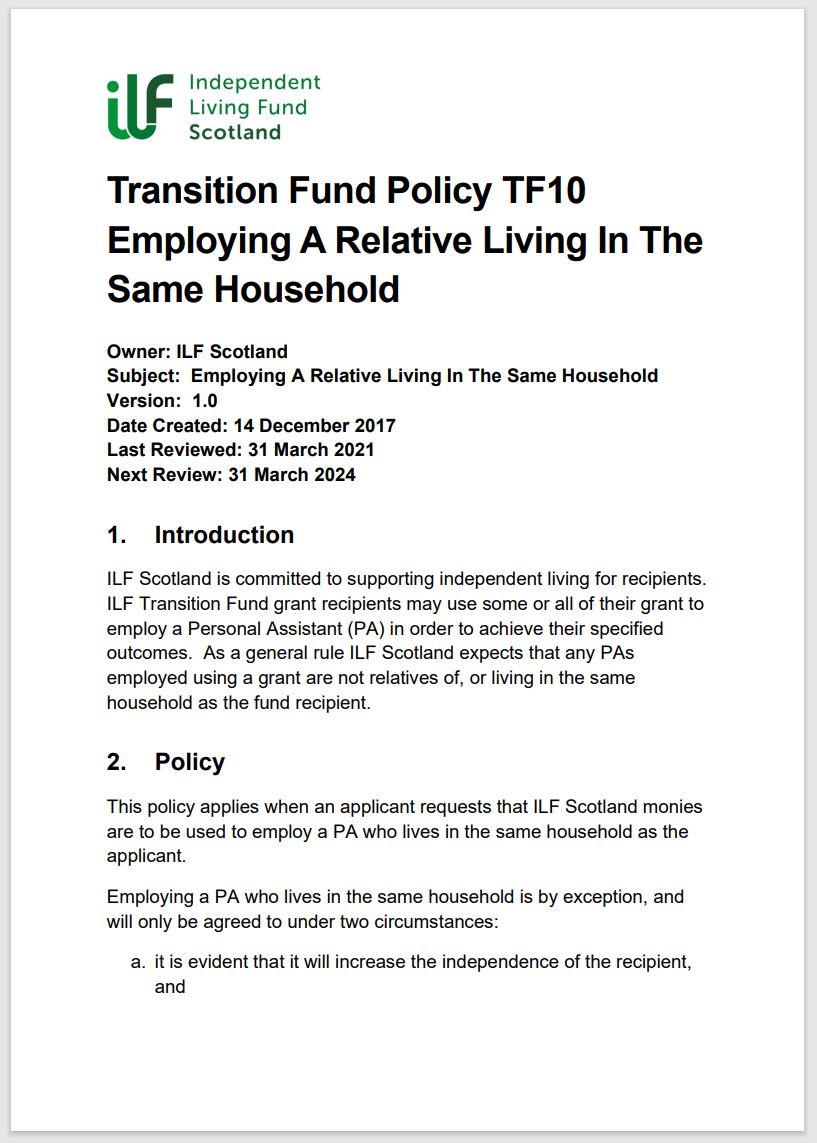
Owner: ILF Scotland
Subject: Employing A Relative Living In The Same Household
Version: 1.0
Date Created: 14 December 2017
Last Reviewed: 31 March 2021
Next Review: 31 March 2024
ILF Scotland is committed to supporting independent living for recipients. ILF Transition Fund grant recipients may use some or all of their grant to employ a Personal Assistant (PA) in order to achieve their specified outcomes. As a general rule ILF Scotland expects that any PAs employed using a grant are not relatives of, or living in the same household as the fund recipient.
This policy applies when an applicant requests that ILF Scotland monies are to be used to employ a PA who lives in the same household as the applicant.
Employing a PA who lives in the same household is by exception, and will only be agreed to under two circumstances:
a. it is evident that it will increase the independence of the recipient, and
b. it is the only satisfactory means of having the support needed to meet the recipient’s outcomes.
If it is the only means of meeting the recipient’s outcomes, all other alternatives should have been proved to be ineffective (or unsatisfactory), and have been exhausted. It should be seen as the last resort only.
Where the recipient feels that there are reasons why only a particular individual in their household can provide the necessary support to achieve their specified outcomes they may request ILF Scotland to consider this request. Permission must be gained in advance.
Where this request is unsuccessful the recipient may appeal in line with Policy TF11 - Decision Review.
Each individual situation will be considered on its own merits and, although the factors in this guidance will be taken into account, these factors should not be considered as a checklist of reasons for agreement. An ILF Scotland Assessor visit will be arranged, during which the specific circumstances will be considered in line with the procedure outlined below (Section 5).
ILF Scotland defines members of a household as:
a. a person’s partner
b. any of a person’s: parent, child, grandchild, grandparent, aunt, uncle, niece, nephew or sibling
c. any of a person’s: step-relations or his or her partner’s relations within the degrees of relationship set out in (b) above, and whether arising through marriage or civil partnership
d. the partner of any person falling within (b) or (c) above. e. any person not covered in (a),(b),(c) and (d), but who lives in the same household as the recipient (see section 4)
This does not apply to:
i. an individual who is recruited and employed by an agency as a live-in support worker
ii. a PA who spends a proportion of their week in the household but who has their main residence elsewhere
Where a recipient lives in an annex to the main house in which their relatives reside, and wants to employ one of these relatives to provide their care and support, there needs to be evidence that the recipient’s house is regarded as a separate dwelling.
Different factors can lead to a decision on whether there are separate dwellings, and, these can include:
a. each house having exclusive occupation and access
b. separate postal addresses
c. separate council tax billing
d. separate utilities
e. the two houses to be able to be sold separately from each other and
f. no conditional restrictions on occupancy.
Where the test for living in a separate dwelling is met, the procedure set out below (section 5) will not apply.
ILF Scotland will allow a request to employ a Personal Assistant who lives in the same house, in exceptional circumstances only.
The recipient will need to demonstrate that employing their Personal Assistant will improve their independence and is the only option available, having tried all available alternatives.
An assessor’s visit will be necessary to review the exceptional circumstances of the case and make a referral to ILF Scotland for a decision. ILF Scotland should request, where possible, that the recipient is seen separately from the Personal Assistant who is proposed to be employed.
The Assessor has no discretion to make a decision. The purpose of their visit is to collect information and offer a professional opinion to ILF Scotland. ILF Scotland will consider the information gathered by the Assessor, along with their professional opinion, before making a decision and informing the applicant.